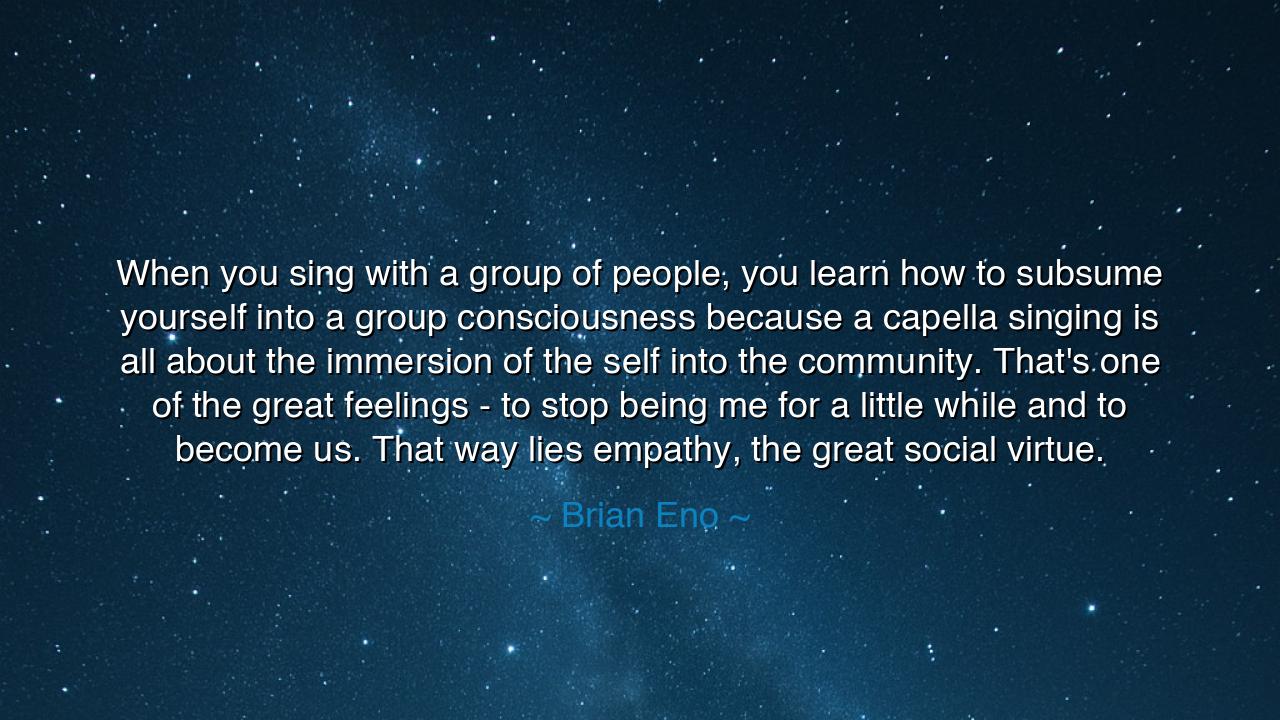
When you sing with a group of people, you learn how to subsume
When you sing with a group of people, you learn how to subsume yourself into a group consciousness because a capella singing is all about the immersion of the self into the community. That's one of the great feelings - to stop being me for a little while and to become us. That way lies empathy, the great social virtue.






“When you sing with a group of people, you learn how to subsume yourself into a group consciousness because a capella singing is all about the immersion of the self into the community. That's one of the great feelings — to stop being me for a little while and to become us. That way lies empathy, the great social virtue.” Thus spoke Brian Eno, the visionary composer and philosopher of sound, who sought not only to create music but to understand its power to transform the human spirit. In these words lies a truth as ancient as the first tribe that gathered around a fire to sing beneath the stars — that music, when shared, dissolves the walls of the self and reminds us that we are one.
In this reflection, Eno reveals the sacred paradox of togetherness: that to truly belong, one must let go of the ego. In a capella singing, where no instrument separates the voice from the heart, each singer becomes both an individual and a thread in a larger tapestry. Alone, the single voice trembles; together, the harmony soars. The act of singing as a group teaches the soul humility and communion. Each must listen as much as they express; each must yield to the rhythm of the whole. Thus, the self — so often the tyrant of modern life — is quieted, and a greater self, the collective consciousness, takes its place.
It is in this surrender that Eno finds what he calls empathy, the great social virtue. For empathy is not a thought but a feeling — the ability to sense the soul of another as your own. When one sings in harmony, one feels this truth in the bones: that our voices are separate, but our song is shared. To “stop being me and become us” is to awaken the most profound moral awareness — that my joy is incomplete if others suffer, that my strength grows when others rise, that my life finds meaning in connection. In a world obsessed with individuality, Eno’s words remind us that true greatness is not in standing apart, but in standing together.
Such a principle was known to the ancients. In the rituals of Greece, in the chants of the temples of Egypt, in the drums of Africa and the hymns of the early churches, communal singing was more than music — it was a spiritual technology. When the Spartans sang before battle, they sang not to display their voices, but to unite their spirits; when monks in cloisters lifted their chants, they sought not beauty for the ear, but harmony of the soul. And in the small villages across the world, from the fjords of Scandinavia to the deserts of Arabia, people still gather to sing — to reaffirm that the human voice, in joining others, becomes a bridge between hearts.
Consider the story of the Civil Rights Movement in America. Amidst fear, violence, and oppression, it was not weapons that gave courage to the marchers, but song. When voices rose in “We Shall Overcome,” strangers became brothers and sisters. The melody became their shield, the harmony their strength. The individual dissolved into the collective, and from that unity came the power to endure and to change the world. In that moment, as Eno would say, they ceased to be “me” and became “us.” From such communion was born empathy — not only among the singers but in all who heard them.
There is a lesson here for our own age, where isolation has become epidemic and the self is worshipped as an idol. We have forgotten the art of blending — of listening, yielding, and harmonizing. We shout to be heard, but we do not sing to be understood. To live as Eno teaches is to practice harmony not just in music, but in life itself. To listen when others speak; to add your voice not to dominate, but to enrich; to find joy not only in self-expression, but in shared creation. These are the notes of empathy — and together they form the song of civilization.
So, my children, learn this: to become one with others is not to lose yourself, but to find your truer self. For the individual voice gains power only when it joins the chorus of humanity. Seek moments that dissolve the walls around your heart — sing, work, serve, and love in harmony with others. The world does not need more noise; it needs more music. Let your life, then, be a kind of song — where each word, each act, each breath contributes to the greater melody of human compassion.
For in the end, as Brian Eno teaches, the highest purpose of art — and of life — is not expression, but connection. The goal is not to shine alone, but to create light together. When you next find yourself among others, remember the sacred wisdom of the chorus: listen, blend, and rise together. For when we sing as one, we remember that we were never meant to live as “I,” but always as “we” — and in that harmony, the soul of humanity finds its eternal refrain.






AAdministratorAdministrator
Welcome, honored guests. Please leave a comment, we will respond soon